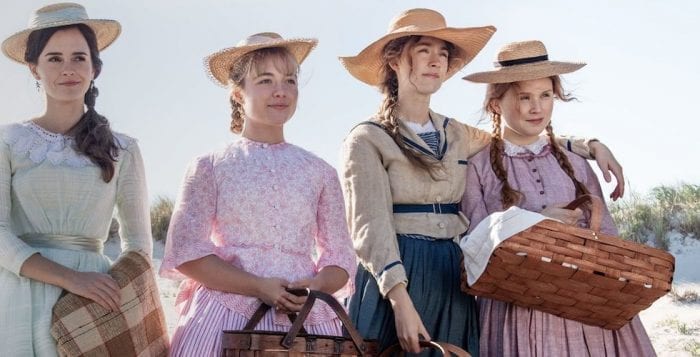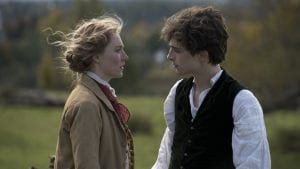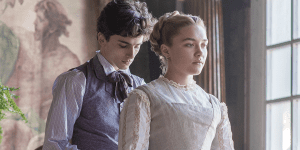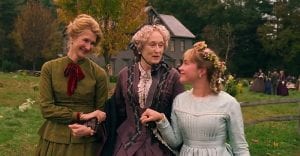Movie Review: A ‘Little Women’ for our time

By Jeffrey Sanzel
Louisa May Alcott’s semi-autobiographical novel Little Women was published in two volumes between 1868 and 1869. It told of the four March daughters: pretty Meg, tomboy Jo, delicate Beth and willful Amy. The book follows them from childhood to womanhood and was both a critical and commercial success. It spawned two sequels: Little Men and Jo’s Boys.
Over the years, there have been multiple screen and television versions and even a Broadway musical. Notable films have included the 1933 George Cukor version starring Katherine Hepburn as Jo; the 1949 one with June Allyson and Elizabeth Taylor; and the most popular, the 1994 version featuring Winona Ryder, Kirsten Dunst and Claire Danes. Best of all is the 2018 Masterpiece/BBC co-production that manages to find the balance between its original source and a contemporary audience.

The newest incarnation is written and directed by Greta Gerwig, best-known for her breakout with 2017’s Lady Bird. There is a distinctly modern feel to the adaptation, and this is unmistakably intentional. The more progressive pieces in the story are emphasized, and it highlights the daughters’ independence. Certain departures from the original story shift some of the motivations and subsequent reactions, but, overall, the film is very true onto itself. It even manages to provide two endings that are able to live side-by-side so that Jo does not lose her individuality.
Little Women is not necessarily long on plot. Instead, it is really a series of events that reveal character. At its heart, it is about a family dealing with the world. Even though it is set during the Civil War, this cataclysmic event stays on the periphery. It is the day-to-day world of the March family: financial challenges, separations, illness, marriage, career. It is the detail with which these struggles and triumphs are told that make the tapestry.
Undoubtedly, it requires a gifted cast, and this one does not disappoint. The quartet at the center all fair well. Emma Watson makes for a dimensional Meg, whose mild vanity does not overwhelm her good intentions. Eliza Scanlen as Beth is appropriately winsome without resorting to the usual caricatures of shyness and fragility.

At the center of any Little Women is Jo, a wonderfully complicated character, whose dream of being a writer drives much of the narrative. Saoirse Ronan is dynamic in her passions and vulnerable in her confusions. She holds center and keeps the story and the family together. But it is Florence Pugh as selfish Amy who finds a true arc and is the only one of the four to succeed in playing the character’s age range and subsequent growth; it is an unusual and artful performance.
Laura Dern’s Marmee is appropriately kind and matriarchal if the most modern of the players. Timothée Chalamet presents a more human Laurie, who, thwarted in his love for Jo, sinks into visible dissipation; it is a bold choice on Gerwig’s part, but it pays off in the resolution.
Meryl Streep’s Aunt March lacks a true imperiousness; part of this is that the brittle and icy center has been softened with some odd choices that are so antithetical to Alcott’s vision, it makes her too knowing and less of an antagonist to both overcome and win over.

In smaller roles, Bob Odenkirk seems lost as the father while Tracy Letts, as Jo’s first editor, Mr. Dashwood, hits all of the right notes. Chris Cooper, as neighbor and later friend Mr. Laurence, never quite gets to underlying pain. James Norton’s John Brooke, Laurie’s tutor and eventually Meg’s husband, has been reduced to a cipher, which is a shame given his importance.
The same could be said of Louis Garrel’s Professor Bhaer, Jo’s New York suitor: there just isn’t enough of him to make an impression. Jayne Houdyshell, as the family housekeeper, Hannah, manages to make the most of her scenes and avoids stereotype as best she can.
One element that has always been a challenge in adapting Little Women is the progression of the sisters from pre-/early teens to twenties. Most have not solved this problem, and this manifestation suffers worse than the previous versions. This is because of the film’s one major flaw: Gerwig chose to eschew a linear structure, instead shifting back-and-forth over about a 10-year period. With one very powerful exception, nothing is gained by this lack of chronology. Many of the shifts are clumsy, and the viewers must regroup to figure out where they were left in the previous time line. For those not well-versed with the story, it would probably make for a confusing and occasionally frustrating experience.
However, putting this aside, the final result is still worthwhile. There is an honest emotional core, and it is hard not to invest into this fresh new foray into the March family. While this might not be the definitive Little Women, it is certainly one for our time. Rated PG, Little Women is now playing in local theaters.






